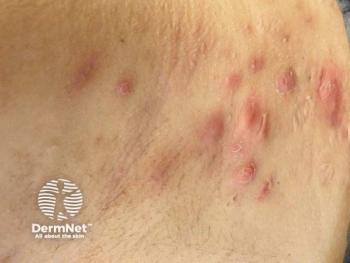
When Comparing JAKs to Immunomodulators, Analysis Revealed Equal or Lower Incidence Rates For Major Adverse Events
Presented at the American Academy of Dermatology Annual Meeting, the poster was the winner of the third place poster award.
In a comparison of Janus kinase (JAK) inhibitors versus conventional immunodulators, an analysis revealed equivalent or even lower incidence rates for major adverse events, including malignancy, according to data presented in a poster at the 2024 American Academy of Dermatology (AAD) Annual Meeting in San Diego, California. The poster was awarded a third place poster winner distinction by the AAD.
Systemic JAK inhibitors have emerged as potent tools in managing various dermatologic conditions; while their efficacy is notable, ongoing clinical trials are delving into both novel applications and approved uses of JAK inhibitors in dermatological treatment. However, concerns linger due to the US Food and Drug Administration's black box warning regarding potential long-term adverse events associated with these agents, according to authors of the poster.
To provide clarity on this matter, researchers conducted a comprehensive literature review, aiming to summarize evidence concerning adverse events linked to oral JAK inhibitors and broader immunomodulators commonly employed in dermatology. The review specifically targeted studies reporting medication exposure exceeding 1 year and subsequent adverse event development.
The medications included in the literature review were systemic JAK inhibitors, cyclosporine, methotrexate, etanercept, adalimumab, and systemic steroids, with the goal of further enriching understanding of the risks and benefits associated with these treatment modalities.
The study revealed no significant disparities in IR/100PYs (Incidence Rate per 100 Person-Years) between JAK and non-JAK treatments concerning malignancy (excluding non-melanoma skin cancer), venous thromboembolic events (VTE), or serious infections.
However, distinct patterns emerged in specific adverse events. JAK inhibitors demonstrated lower rates of non-melanoma skin cancer (NMSC) and major adverse cardiovascular events (MACE) compared to non-JAK medications such as adalimumab, etanercept, cyclosporine, methotrexate, and prednisone.
Conversely, JAK inhibitors exhibited higher rates of herpes zoster virus infections.
These findings suggest that JAK inhibitors may offer a therapeutic advancement with more precise mechanisms compared to broader-acting immunomodulators traditionally used, wrote review authors. Further research was suggested to investigate specific patient populations, characteristics, and risk factors to better understand risks and inform treatment decisions. Additionally, conducting a systematic review to compile all available long-term adverse event data was recommended.
The review, resembling a literature review rather than a systematic literature review, may involve limitations. Lamberg et al noted the review's design may enable potential data omission. Additionally, variations in study designs and reporting methods may introduce biases that could impact the analysis.
"These findings provide valuable insights into the safety profile of JAK inhibitors and have significant implications for guiding the management of dermatologic conditions that necessitate the use of JAK inhibitors or traditional immunomodulators," wrote Lamberg et al.
Reference
Lamberg O, Pandher K, Lim H. Long-term adverse event risks of systemic Janus kinase (JAK) inhibitors versus traditional immunomodulators. Poster presented at: 2024 American Academy of Dermatology Annual Meeting; March 8-12, 2024; San Diego, CA.
Newsletter
Like what you’re reading? Subscribe to Dermatology Times for weekly updates on therapies, innovations, and real-world practice tips.










